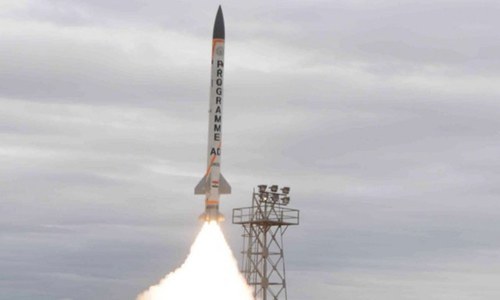NEW submarines, missile defence and now a missile test — India’s breakneck acquisition and development of nuclear weapons systems and platforms are thoroughly alarming and wholly unwelcome.
Already Pakistani officials have warned that the Indian moves are threatening to change the military balance of power regionally and implied that a Pakistani response is all but inevitable.
Good sense and a more comprehensive understanding of national security appear to be falling victim to narrow, militaristic views of security once again, on both sides of the border.
With Pakistan having officially adopted so-called full-spectrum deterrence — itself a reaction to India’s Cold Start doctrine and long-range missile threat — the response to missile defence and nuclear submarines is likely to further complicate the nuclear equation in South Asia.
For India, which is using its strong economic growth as a springboard for massive military outlays, the fiscal logic to avoid an arms race may not be as compelling as it is for Pakistan.
But nuclear strategies need to remain rational, especially if the purported enemy sits right on a lengthy shared border.
Consider the case against missile defence, a fanciful, wildly expensive project that is of dubious deterrent value.
If India does somehow manage to develop and deploy a working missile defence model, Pakistan will have the option of trying to overwhelm the missile defence system with many more nuclear-armed missiles of its own.
That would mean a significantly more nuclearised South Asia.
Adding to the danger is the short flight time between India and Pakistan for missiles — an accidental or mistaken launch of the missile defence system by India could be misunderstood by Pakistani officials as a nuclear attack, and South Asia could in an instant be on the verge of the unthinkable.
Not every military or nuclear development is worth the price — even if India believes it can afford the price tag.
For Pakistan, the ever more exotic realm of nuclear strategy that the country is finding itself pulled into poses real questions about sustainability and desirability.
Second-strike capabilities such as nuclear-armed submarines are prohibitively expensive and pose a host of new challenges.
On submarines, separating warheads from missiles — as Pakistan is believed to do with its nuclear arsenal — becomes more problematic.
Furthermore, new safety, security and chain-of-command issues would come into play.
As for missile defence or missiles with multiple warheads to confuse or overwhelm missile defence systems, they are simply not in the realm of contemplation given the size of GDP and the resource crunch.
Meanwhile, an ever-closer military relationship with China, for example, could have all manner of unforeseen consequences for regional and global stability.
Pakistan is right when it insists that all disputes and issues with India should be resolved through dialogue.
Perhaps now is the time for India to demonstrate a real commitment to dialogue and help prevent South Asia from hurtling over the precipice.
Published in Dawn, May 19th, 2016
















































